Welcome to another issue of The Newport Cornucopia where we dig through the newspapers archives for interesting news articles and adverts. All articles are posted verbatim and most headlines are original (headlines in quotes are my own).

"Empire" Puzzle Pictures
In the summer of 1905, the Empire theatre introduced a new puzzle called "Empire" Puzzle Picture with a prize of £5.
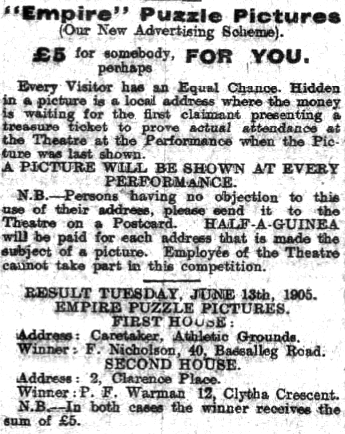
Every Visitor has an Equal Chance. Hidden in a picture is a local address where the money is waiting for the first claimant presenting a treasure ticket to prove actual attendance at the Theatre at the Performance when the Picture was last shown.
The advert appeared throughout June and July (possibly starting on 12th June) and was also held at the Empire in Cardiff and Swansea. By the middle of July it doesn't appear that they ran the competition again.
Early adverts showed the results on a daily basis but was then changed to give the results at the first performance on a Friday.
Results
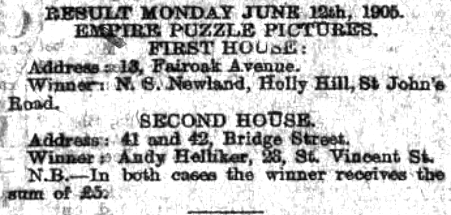
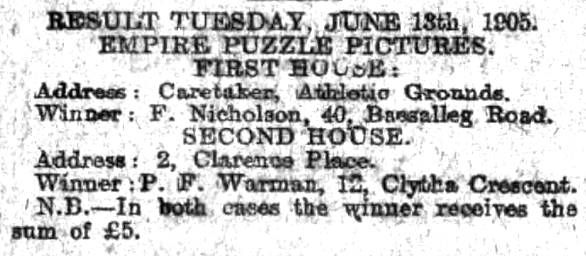
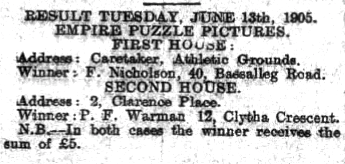

Choosing The Houses
One method of selecting houses to feature in the competition was to have people volunteer. If people were interested they could send a postcard to the theatre expressing an interest and if selected the person would receive half a guinea.
The Prize
In the early adverts (the screenshots above) there were two houses to search for with a prize of £5 for each winner but within a couple of weeks that had dropped and to win the £5 you had to solve three in a week which was a crafty way of making people attend more performances.

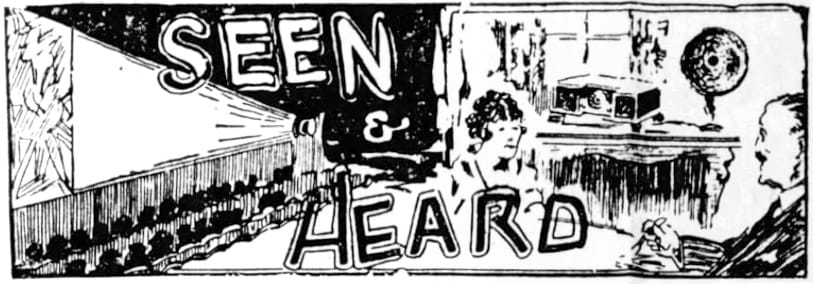
'The Bludgeon'
The bludgeon seems to be a plaything much in vogue in Newport, judging by the recent appearance of a couple at the Newport Borough Police Court lately.
In the first case it was possessed by a mate who used it in defence when attacked by his men aboard ship. In the second instance the bludgeon was the mememto of a memorable and enjoyable night spent in the garden when a would-garden thief was soundly belaboured with it.
The gentleman who was in the dock on Friday, however, thought it fit to brandish this formidable truncheon, which he preserved in memory of the little attentions he bestowed upon his garden depredator in the public street. He has now been deprived of this family heirloom and has paid 10s for publicly exhibiting his memento. The police are on the look-out for such truncheons. They are stronger made and more to the purpose than their own.
— South Wales Argus, Saturday 6th October, 1894 (Subscription Required)
'An Expeditious Judge'
Judge Owen got through the business of the Newport County Court very expeditiously on Friday. There about 150 judgement summonses, and his Honour completed the work in about an hour and a half. That would be at the rate of five in every three minutes. In some of them, too, several witnesses had to be examined.
— South Wales Argus, Saturday 17th June, 1905 (Subscription Required)
'Wet-Monday'
The Newport parks were well patronised on Thursday by groups of Sunday-school children who were taken out by their teachers to make some compensation for the loss of their out-of-door delights on Wet-Monday. Beechwood especially was all alive, and the fact that it affords so much better facilities for fun, frolic, and freedom causes its wooded hollows and grassy slopes to be much enjoyed.
— South Wales Argus, Saturday 17th June, 1905 (Subscription Required)
'Robert Baden-Powell Visits Newport'
Major-general Baden-Powell was highly pleased with the manner in which the Newport police kept order on the streets on Thursday and, after the inspection, heartily congratulated Chief-constable Sinclair. He was greatly pleased with his reception, and afterwards told the Mayor that he had never had such a hearty reception in any other town in which he had been inspecting a Boy's Brigade.
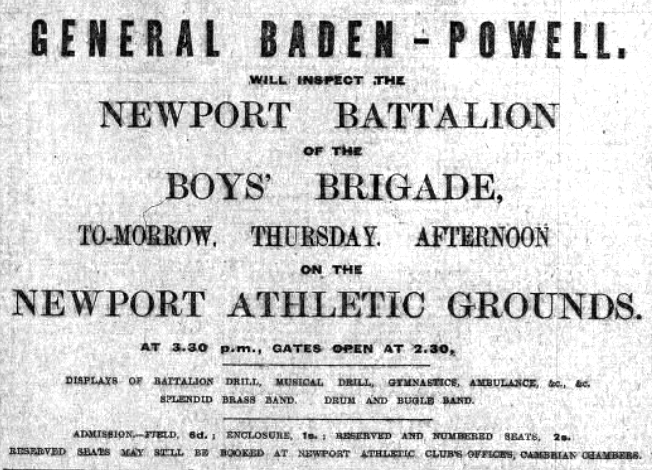
One or two interesting items were omitted from our report of Thursday's inspection. Tea had been arranged for the boys in the Stow Hill Drill Hall, which had been kindly placed at their disposal by the 2nd V.B.S.W.B. As the lads were marching in the hall, General Baden-Powell took up a position in one of the front windows overlooking Stow Hill and there, bareheaded, carefully watched the whole battalion enter the hall. The gallant officer expressed himself as very pleased with the steadiness with which the lads marched in, especially in view of the fact that hardly any of them knew he was watching them.
After having a cup of tea in the officers' mess prior to his departure for Llanwern Park, the General came out on the platform, and received a tremendous ovation from the officers and boys. After an introduction, he shook hands with all the officers, and gave a few words of helpful encouragement to them. Then he left for Llanwern, accompanied by another hearty outburst of cheering.
— South Wales Argus, Saturday 17th June, 1905 (Subscription Required)

The Social Evil
"Strike the evil at the root," is an old and wise adage, the study and practice of which by our local authorities would materially benefit the public. Local improvements other than the mere widening of old or forming new streets, scavenging and draining, are required. A great social evil exists in our midst, and must be suppressed; before there can be the faintest hope of materially ensuring the welfare of the respectable inhabitants, the dens of infamy must be annihilated.
Much has been said about Friars Fields, and other low localities, with their poverty, wretchedness, debauchery, and crime. These are so tainted that all respectable people avoid them as they would a plague. But there other localities, professedly respectable, where debauchery and crime have as hideous a mien as that which the lowest haunts of vice possess. The houses to which we now refer, to keep up the character of the locality, wear an aspect of neatness in the exterior that vies with the adjoining dwellings of the industrious and virtuous. To all such the presence of these moral pest houses must be anything but satisfactory. The example is most dangerous to those rising families which are there growing up.
We have our eye now upon a new part of the town, where debauchery seems to be at a premium. Prostitution holds high carnival on the Cae Crook estate, where a large population has been collected. Aided by those worst of all houses which the wisdom of our legislators has licensed for the sale of beer, the house of the harlot in the district to which we now refer is a disgrace to any community. Abandoned women, ticket-of-leave convicts, thieves of all descriptions are to be found in the several houses that exist in Llanarth-terrace, and their presence, as may be supposed, gives a riotousness to the neighbourhood which makes it unenviable. The reason why that locality has been selected is obvious. It is isolated from the common public gaze. The great mass of the people do not walk that way; and therefore those who nightly sacrifice at the debauchee's shrine are less likely to be interrupted.
True it is that there is great difficulty in dealing with such excrescences on the social body. However, Mr. Graham, on the 28th ult., called the attention of the Town Council to the provisions of the Local Government Act, and to that we beg the hon. member's attention again, because it contains powers which will enable the Council to deal with the evil now under consideration. There ought to be no squeamishness about the matter. Gentlemen in the position of town councillors may not often realise the state of things which exists in these localities. Living in their suburban villas, and surrounded by their families and luxuries, they do not consider, perhaps, the pollution and misery which are being propagated in those very houses with which they are directly or indirectly concerned. The stem truth ought to be told them, and we tell them that there is a great social evil which it behoves them to do something to lessen, or they may one day have to regret the supineness which they manifested. Indictments preferred jointly against owners, agents, and occupiers of the houses of infamy would have the effect, we may hope, of putting down the shameless immorality which every right-minded person deplores. Who will take the lead?
— The Cardiff Times, Saturday 16th October, 1858

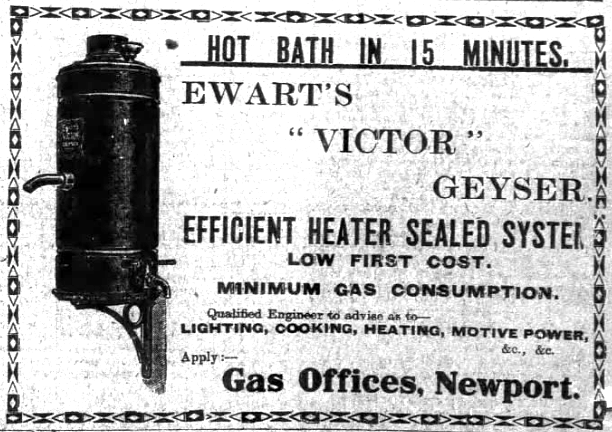

'Fraud at the Newport Bank'
Beyond what was published in The Cambrian in 1805, unsure what the outcome was of this story.
We are sorry to understand, that a forgery on the Newport Bank (Monmouthshire) has very recently been discovered to an amount rather considerable; in which an individual who has hitherto borne a fair character is implicated, and who is not expected long to elude the strict search no making after him.
— The Cambrian, 13th April, 1805

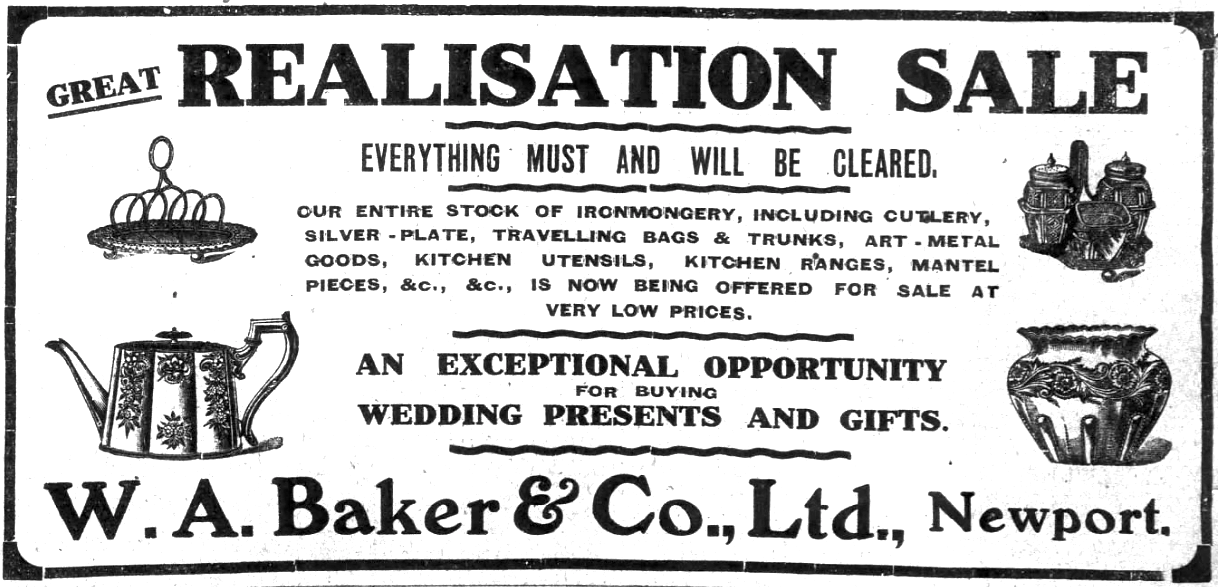


Stealing a Sheepskin
Edward Cole and Thomas Lewis were charged with stealing a sheepskin, the property of John Blackmore. John Pratt, a servant to the prosecutor, said he saw a sheepskin lying on a truss of hay on Wednesday, the 6th inst., at Mr. Bond's premises in Fothergill-street. He afterwards missed a skin, which was marked, and gave notice to the police. The skin produced is the same.
The sheep was killed in a peculiar way—for the Jews. George Dwyer, in the employ of Mr. Ballard, tanner, said he bought the skin produced on Monday last in Mr. Ballard's yard, off a young man. Mr. Ballard paid 2s. 6d. in his presence for the skin. Thomas Acton Ballard said, on Monday he was called by the last witness to pay for the skin; saw two men with him at the time. Could not swear to Cole; but thought the prisoner Lewis was with the man to whom he paid the money. He would not like to swear to him, but he was something like that man.
Sergeant Bath said, on Thursday last he apprehended Cole, and charged him with stealing the skin and selling it to Mr. Ballard. Cole said "I did not sell one to Mr. Ballard." Witness afterwards saw Lewis in custody, and heard him say, "I did not steal the skins; I know nothing about it. I saw Ted in Cross-street, and he asked me to come up to the tan-yard with him. We went together, Ted (meaning Cole) went inside and I stopped out."
Cole afterwards said he did not get the skin from Mr. Blackmore's slaughter-house; but he owned up to taking another from another person. Both prisoners live in Fothergill-street, near the slaughter-house of the prosecutor. The prisoners having elected to be tried summarily, pleaded not guilty. For the defence of Cole, Mr. Bond, blacksmith, was called to prove that he (Cole) was in his shop at about five o'clock. Bond said he did not remember seeing him there but he would cut the matter short and say that he believed Cole stole the skin, and he told him so. The irritability of the witness caused much laughter. Lewis was discharged; Cole was sentenced to fourteen days' imprisonment with hard labour.
— The Cardiff Times, Saturday 23rd October, 1858
Charge of Stealing Hair
Mary Sefton, remanded from Wednesday on a charge of stealing a quantity of cow's hair, the property of Mr. Rees, tanner, was brought up for further examination. The prosecutor's yard is adjoining that of Mr. Ballard, for whom the prisoner's husband works, and she had been in the habit of coming into the yard with her husband's dinner, which caused him (prosecutor) to suspect her. He could almost swear to the hair, but could not swear to having missed any quantity of it. The prisoner had sold the hair produced, to a Mr. Grant. The Bench did not think the evidence: sufficient to convict. The prisoner was discharged.
— The Cardiff Times, Saturday 23rd October, 1858
Driving Without Reins
Herbert Reed pleaded guilty to a charge of riding on a cart without reins to guide the horses. In mitigation of the offence, defendant stated that he was riding on the handles of the three-wheeled cart belonging to Mr. Phillips, which was necessary to guide it. To pay costs, 6s. 6d.
— The Cardiff Times, Saturday 23rd October, 1858
Noisy Milkman
Edward Norman was summoned at the instance of the police continuously shouting and calling out while vending milk at 11.30am on a Sunday Morning. Arthur Thompson, his employer, was charged with aiding and abetting. Norman stated that his master told him to shout. Thompson's excuse was that he had a lot of milk on his hands, and he was bound to get rid of it that morning, or it would have been spoiled. The Bench inflicted a fine of 2s 6d, and the case against the boy (Norman) was dismissed with a caution.
— South Wales Argus, Wednesday 5th April, 1899 (Subscription Required)
Stone Throwing Nuisance
John Dowding, 19, was summoned for throwing a stone and striking a window in Lyne Road. It appeared that the stone was intended for a dog, but it struck and "starred" the window at Mr White's shop. The Bench imposed a penalty of 10s. Alfred Binning, Walter Cobb, Stanley George, thirteen-year-old lads, were fined 1s each for throwing stones in Dock Street.
— South Wales Argus, Wednesday 5th April, 1899 (Subscription Required)
Too Fat for the Frenchman
Perry Pairi George, a seaman, admitted deserting the French barque Danse, lying at Newport. The evidence was given in French, Mr Canning acting as interpreter. The prisoner was seen leaving the Dock premises, carrying a bundle. He gave as his reason for desertion that the food on board was too fat. The justices ordered the prisoner on board.

— South Wales Argus, Wednesday 5th April, 1899 (Subscription Required)
Theft of a Rope
Benjamin Alexander Bagley was charged with stealing a rope from a yard in Mountjoy Road, the property of Messrs. Hancock and Co., brewers. Upon being charged he said,
"This is all through the drink, and I would willingly give a sovereign if they would let it drop."
The piece of rope (produced) had been obtained from a marine store and identified as the property of the prosecutors. It appeared that prisoner jumped a wall, eight feet high, and protected by glass, to get into the yard. Mrs Davies, wife of a marine store dealer, spoke to purchasing the rope, which was identified by a man in Messrs. Hancock's employ as the prosecutors' property. Prisoner, who acknowledged the theft, was fined £1.
— South Wales Argus, Wednesday 5th April, 1899 (Subscription Required)
'Mother Beats Child with Potato Masher'
Ellen Sullivan was charged with an assault on her own child by beating her with a potato masher. Ellen Sullivan, aged eleven, said the defendant took the weapon from the window, which it was used to prop up, and threw it at her; but she did not mean to do it. The defendant, who exhibited no signs of contrition, endeavoured to justify her conduct by stating that she only threw the weapon to frighten the child. The piece of wood, a heavy eapon, had struck the child in the head. The Bench, animadverting on the conduct of the defendant, who is habitually a drunkard, said it would be in accordance with justice and their own wish to send her to Usk.
Prisoner: Sure, an' you wouldn't be so cruel as that, Misther (sic) Williams; ye're too good for that (laughter).
The Bench, after a consultation, said they felt it their duty to send her to prison for fourteen days, with hard labour. Committed.
— The Cardiff Times, Saturday 23rd October, 1858
Juvenile Thieves
William Henry Joseph and Thomas Jones, two juveniles, were charged with attempting to steal, from a stall in the market, goods belonging to Mrs. Wallis, on Tuesday morning. Charles Thomas saw the boys unlock the door of the stall and turn the things over. They were preparing to take several things away when witness went in and stopped them.

It was only a few weeks since that Joseph was convicted of stealing a box of cigarettes from Mr. Bryan's shop. The boy's father did what he could for him, but to no purpose. Nothing was known against Jones, and he was discharged. Joseph was sentenced to one month's hard labour, and five years in a Reformatory School.

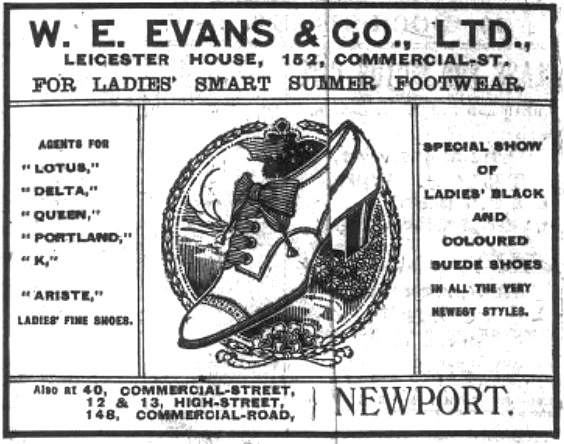

Sarah Bernhardt Visits Newport
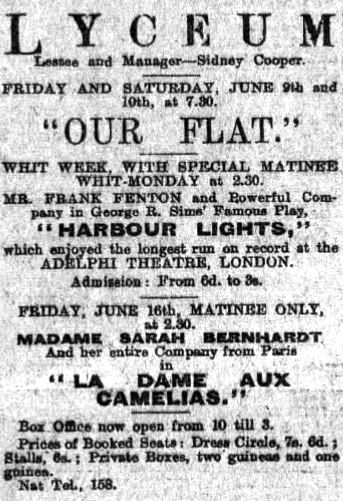
In June 1905, the famous French actress Sarah Bernhardt paid a flying visit to Newport with a single matinee performance at the Lyceum.
Many-sided in genius, consummate in art, world-famous Madame Sarah Bernhardt paid a flying visit to Newport to-day, and appeared at a matinee at the Lyceum, in one of her most famous characters, "Marguerite Gauthier, la dame aux camelias." Such an event naturally attracted unusual attention, and the house was packed from floor to ceiling with an audience thoroughly representative of Monmouthshire.
— South Wales Argus, Friday 16th June, 1905 (Subscription Required)

Whilst the performance by Bernhardt and her Parisian company received rave reviews from the South Wales Argus, one person who wrote to the newspaper was unhappy with how some of the audience at the show behaved.
Sir, "Why do non-musical people go to concerts?" "Why do people who do not understand French go to a French play?" "Why not if we want to?" they will probably say. There is no objection, provided they can behave themselves, but there is every objection if, during a large part of the performance they keep up a loud conversation between themselves. I guarantee that, except when the great actress was herself in possession, there was more talking off the stage than on it; when sue appeared there was comparative silence, during the rest of the time the buzz of conversation was so loud and continuous as to make it practically impossible to hear more than an occasional word; this was certainly not the fault of the company who, without exception, spoke their lines splendidly and distinctly. It was a poor compliment to the company and Mr. Cooper, to whom we are deeply indebted for this efforts to provide us with first-rate plays and companies. The worse offenders were, I regret to say, in the higher priced seats—is it possible that they were aping the bad manners of the opera-goers at Covent Garden, about which we have lately head so much?
Yours, etc.
MANNERS MAKETH MAN

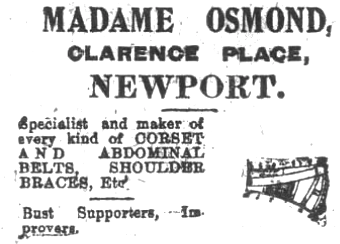

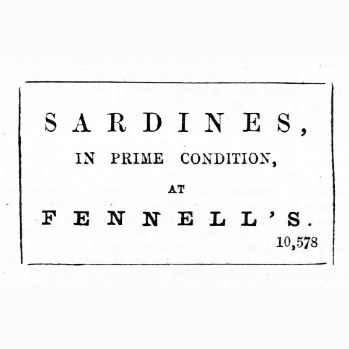
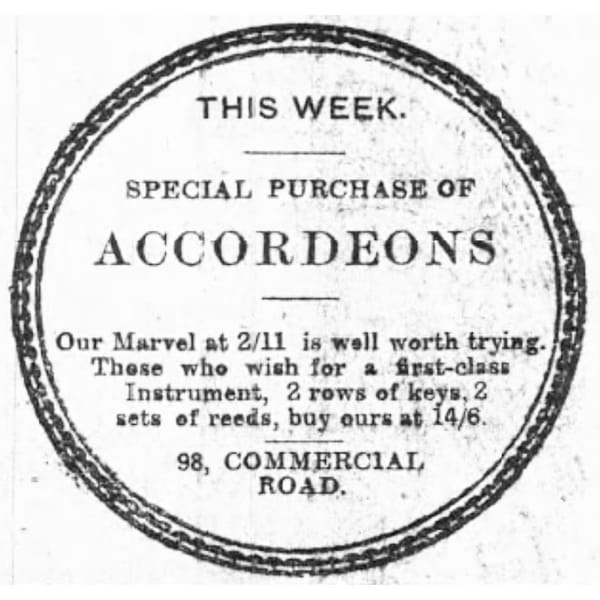
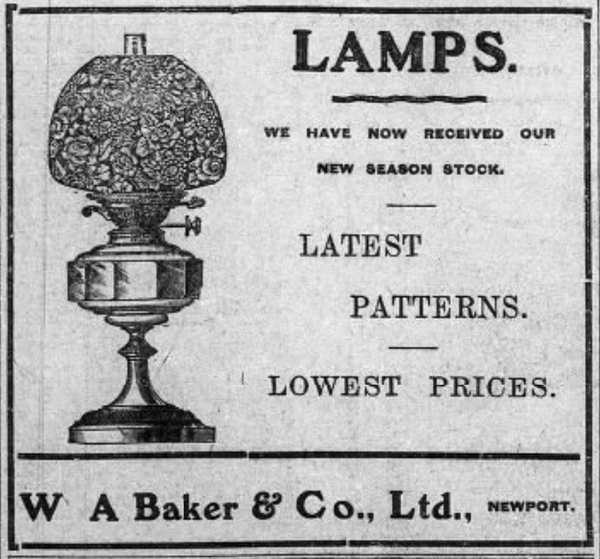


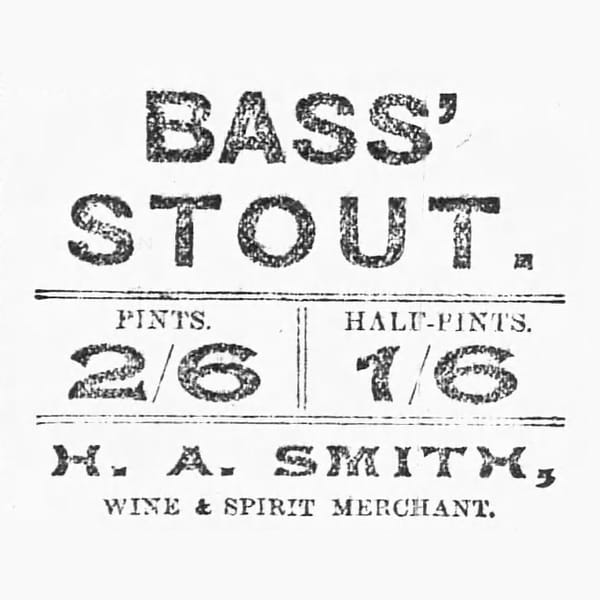
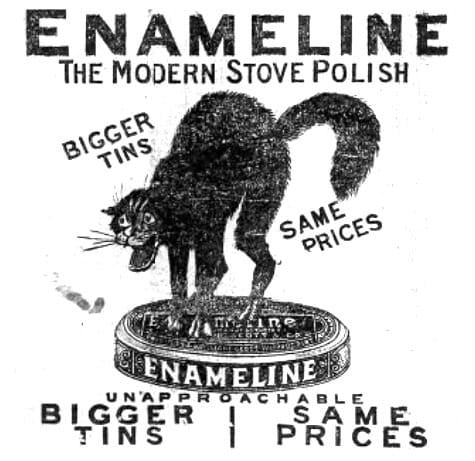
Member discussion